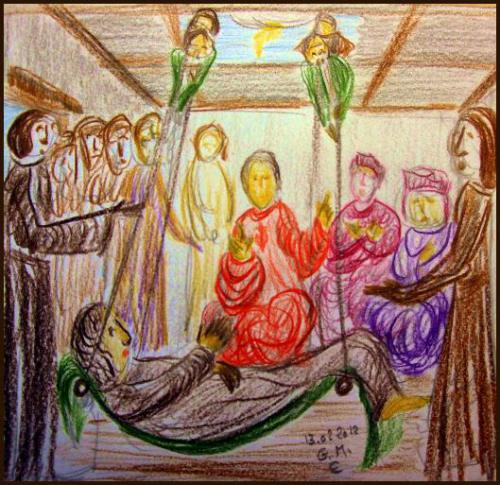A Funeral Homily for Bob – Mark 2:1-5
Caitlin Trussell with Augustana Lutheran Church on June 29, 2015
Bob was one of the first people I met when I arrived at Augustana. His quiet way, his one-liners, his love for Carol, and his pride and gratitude for his children were common topics through our conversations both in his home and before and after worship here in this sanctuary.
Most of you here this morning have stories with Bob that go back much longer in time. Through many of you, I’ve heard details of his history including his service in the Pacific during World War II and his long-standing work as a Petroleum Engineer after graduating from the Colorado School of Mines. You’ve also talked about the fun he had tinkering and creating as well as the joy he took in volunteering with his church including reading to the kids in Augustana’s Early Learning Center.
Through these details of history, there is much about Bob that came through as well. These are the intangibles – the things that thread together over time. Bob’s kindness, his humor, his love of the outdoors, and his willingness to lend a hand no matter how small or large the problem.
In the last few years of his life, it was Bob who needed your hands. Always ready to help, he now needed help. And you rose to the occasion. While this was difficult for Bob, he talked a lot with me about how grateful he was that his children and his friends did what they could, when they could, to make life a little easier even as it became more difficult.
Hear these words from the Bible as they speak into the tears of love and grief in this time to celebrate Bob’s life and to mourn his death; from the 2nd Chapter of the Gospel of Mark:
When he returned to Capernaum after some days, it was reported that he was at home. 2So many gathered around that there was no longer room for them, not even in front of the door; and he was speaking the word to them. 3Then some people* came, bringing to him a paralyzed man, carried by four of them. 4And when they could not bring him to Jesus because of the crowd, they removed the roof above him; and after having dug through it, they let down the mat on which the paralytic lay.5When Jesus saw their faith, he said to the paralytic, ‘Son, your sins are forgiven.’
What a scene! These friends are true problem solvers. Their paralyzed friend needs help and they head toward Jesus. There were so many people that they couldn’t get in the house. So they head up to the roof and tear it open to lower their friend down to Jesus. That is determination infused with deep love for their friend. As you all shared story after story with me about Bob, this Bible story just shouted to be told. I can imagine Bob up on that roof. Quietly figuring out the physics of the friend on the mat, the ropes, the hole in the roof, and Jesus’ location. Working with the other friends to figure out how to bring their paralyzed friend to Jesus’ attention.
On the flip-side, I can also see Bob as the friend on the mat. The one who desperately needs care from other people and also needs the attention Jesus. In my conversations with Bob, he was acutely aware of his imperfections – the limits of how far his humanity could get him. And this is where his testimony as a Christian is so powerful. He worshiped Sunday after Sunday with the awareness and humility of the paralyzed friend on the mat who can’t help but capture Jesus’ attention and hear Jesus’ promise of forgiveness of sins.
This begs a question to the opposite. And that is, how might God go about getting our attention? What are the means by which that may have been possible? God, at some point, needs to grab our focus in ways that we might have some shot at understanding. God needs to speak in human terms – much like the friends risking their own lives and limbs to lower their friend to Jesus.
Think about it this way: What are our first thoughts when we hear of someone who dives into a raging river to save someone from drowning, saves that person but succumbs and dies in the flood waters themselves? What kinds of things do we say to honor the soldier who returns again and again to the firefight to save fallen friends? Jesus says, “No one has greater love than this, to lay down one’s life for one’s friends.” After all, how much more can be given?[1] Jesus was tried, crucified, dead and buried. In every way that the cross could be offensive, it is.
It’s offensive to think that the cross, and Jesus hanging there, was necessary or effective in any way. That we even need saving is offensive. That this appalling execution can change anything about real life seems at worst a massive deception and at best an utter folly. And yet, alarmingly, and quite surprisingly, it does. Jesus death on the cross changes everything because Jesus is God and God is Jesus. And God’s self-sacrificing death on a cross means that God would rather die than lift a hand in violence against us. This is the God that Bob counted on and this is the God that shows up for Bob.
Jesus is focused on the goal of bringing people back into relationship with God. That is what the language of forgiveness means. God is not irresistible. But God always takes us back. The self-sacrificing love of God, given fully on the cross, draws us back into relationship with God. [2] God has already opened up whatever we perceive the barriers to be between us and God.
The love of God in Christ Jesus moves from God to us – we don’t create its momentum or its arrival, God’s love is simply given. The love of God in Christ Jesus moves from God to Bob. And because it is God’s movement to us, God’s movement to Bob, God gives us a future with hope as God also brings Bob into a future with God. Amen.
[1] Craig Koester, class notes, Luther Seminary: Gospel of John class: John’s Theology of the Cross. December 1, 2010. I am sincerely grateful for Dr. Koester’s faithful witness as a master of holding aspects of Jesus Christ’s life and work in formative tension. His work is beautiful, articulate, and draws me more deeply into faith and love of Jesus.
[2] Koester, course notes, 12/1/2010. For further study see: Craig R. Koester, The Word of Life: A Theology of John’s Gospel (Grand Rapids: Eerdmans, 2008).



![It’s Going to the Birds [In a Markan, Hitchcockian Kind of Way] – Mark 4:26-34, 2 Corinthians 5:6-7, 14-20](http://caitlintrussell.org/wp-content/uploads/2015/06/Mustard-Seed-and-Bird.sermon-Caitlin-Trussell.jpg)